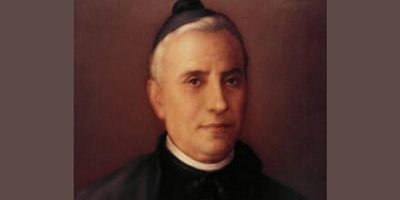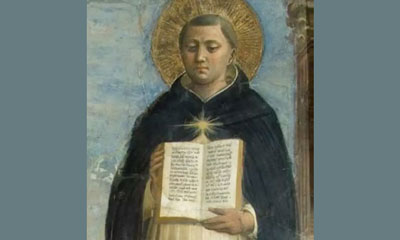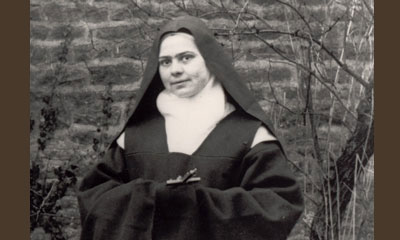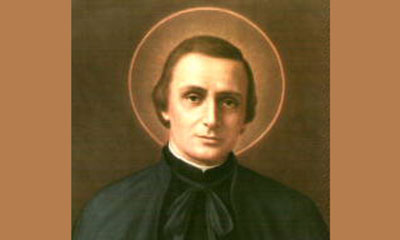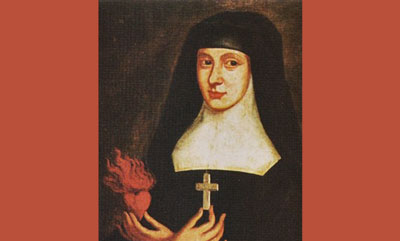May 20, 2017
Saint Josep Manyanet
Dear Friends,
The Holy Family of Nazareth, wrote Pope John Paul II, “is … the prototype and example for all Christian families. It was unique in the world. Its life was passed in anonymity and silence in a little town in Palestine. It underwent trials of poverty, persecution and exile. It glorified God in an incomparably exalted and pure way. And it will not fail to help Christian families—indeed, all the families in the world” (Exhortation Familiaris Consortio, November 22, 1981, no. 86). Some years later, on May 16, 2004, Saint John Paul II canonized Josep Manyanet, “a true apostle of the family,” who dedicated his life so that every family might be a “Holy Family.” The message that the new saint passes on to us is still fully relevant today.
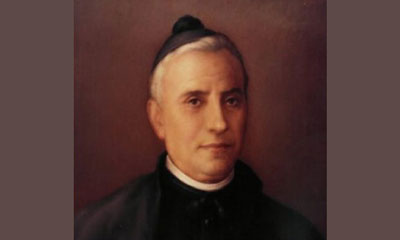 Josep Manyanet I Vives was born on January 7, 1833 in Tremp, a small Catalan town in the Diocese of Urgell, in Spain. He was baptized the same day in the parish church of Our Lady of Valldeflors, which rose majestically close to his house. Josep was the ninth child of Antonio Manyanet and his wife Buenaventura Vives, small landholders in the region. The baby was just twenty months old when his father died at the age of forty-four. In 1841, the eldest son of the family also died. Widowed and with no means of support, Mrs. Manyanet had to make the most of administering the modest inheritance, selling or leasing out the family lands, while devoting herself to raising her children. A very pious woman, she put her trust in the protection of God and the Blessed Virgin Mary. When Josep turned five, his mother brought him before a painted statue of Mary, dating from the 15th century, to consecrate him to the Virgin. After a fervent prayer, the child saw the Madonna open her arms to him and press him to her heart.
Josep Manyanet I Vives was born on January 7, 1833 in Tremp, a small Catalan town in the Diocese of Urgell, in Spain. He was baptized the same day in the parish church of Our Lady of Valldeflors, which rose majestically close to his house. Josep was the ninth child of Antonio Manyanet and his wife Buenaventura Vives, small landholders in the region. The baby was just twenty months old when his father died at the age of forty-four. In 1841, the eldest son of the family also died. Widowed and with no means of support, Mrs. Manyanet had to make the most of administering the modest inheritance, selling or leasing out the family lands, while devoting herself to raising her children. A very pious woman, she put her trust in the protection of God and the Blessed Virgin Mary. When Josep turned five, his mother brought him before a painted statue of Mary, dating from the 15th century, to consecrate him to the Virgin. After a fervent prayer, the child saw the Madonna open her arms to him and press him to her heart.
The Virgin of Valldeflors
One day, the child fell into freezing water and was taken back to the house unconscious. Everyone thought he was lost, but his mother made an appeal to the Virgin, and the child instantly regained consciousness. Not long thereafter, soldiers were received at the family home. Dazzled by their uniforms, Josep trembled with happiness in their midst. A careless soldier inadvertently spilled boiling oil on him. The child’s body was one solid wound and they despaired of his condition. The Virgin of Valldeflors was once again called upon, and granted the child complete healing with no aftereffects, to the amazement of the doctors.
The parish priest, Father Valentín Lledós soon took notice of Josep. He took him under his wing, such that, following Samuel’s example (1 Sam. 2:11), the boy no longer strayed from the temple of his beloved Virgin of Valldeflors. He learned to serve the Mass. His religious formation was provided by this excellent teacher, but above all by his mother who arranged a small room for him in the oratory. When the child could not be found at school or in the church with Father Valentín, they had to look for him in his oratory, where he passionately devoured the lives of the saints. At the age of seven and a half, he made his First Communion. A great delicacy of conscience radiated from his entire being.
Seeing in the child the signs of a call to the priesthood, the priest did everything he could to aid his studies. He guided him toward the Piarist school, run by the institute founded by Saint Joseph Calasanz in the 16th century. To pay his school fees, Josep worked for the community and other students. In 1849, he received the sacrament of Confirmation. In a note shortly thereafter, he wrote: “Now you are confirmed and armed like a soldier of Christ. This obligates you to fight like a man against all the tricks of the enemy, and to make yourself ever more worthy of the love of God and of the Most Blessed Virgin.”
The effect of the sacrament of Confirmation is the full outpouring of the Holy Spirit in the soul. Thus, Confirmation brings an increase and deepening of baptismal grace: it roots us more deeply in the divine filiation that enables us to say Abba, Father (Rom. 8:15); it unites us more firmly to Christ; it increases the gifts of the Holy Spirit in us; it renders our bond with the Church more perfect; it gives us a special strength to spread and defend the faith by word and action as true witnesses of Christ, to confess the name of Christ boldly, and never to be ashamed of the Cross. “Recall then,” said Saint Ambrose, “that you have received the spiritual seal, the spirit of wisdom and understanding, the spirit of right judgment and courage, the spirit of knowledge and reverence, the spirit of holy fear… Guard what you have received. God the Father has marked you with His sign; Christ the Lord has confirmed you and has placed His pledge, the Spirit, in your hearts” (cf. Catechism of the Catholic Church, nos. 1302-1303).
Fight energetically
Through contact with the religious of Piarist schools, Josep initially felt a desire for religious life, but he soon understood that the Lord did not want him to join the Piarists. After this first academic cycle, his parish priest sent him to study philosophy at the seminary in Lleida. To pay for his studies, the young man worked as a private tutor for a family in the city. Aware of the dangers that he faced staying in the city, he wished to be able to be admitted someday as a boarder at the seminary. In fact, during his stay in Lleida, he had to mortify himself and fight energetically to overcome the entreaties of a woman who was in love with him.
After three years of philosophy, Josep went to La Seu d’Urgell, the seat of his diocese, to study theology. He was the age for army conscription, but a brother of Father Valentín paid the amount that freed him of this obligation. On his arrival, Josep offered to work for his school expenses. Bishop Josep Caixal Estradé took him into his personal service, and became his confessor and spiritual director. Josep Manyanet served the prelate with all his heart. The bishop would later testify: “No one knew better than him how to interpret my wishes.” At the end of 1854, exhausted by the service he had rendered, he was sent by his bishop to a seaside resort for a rest. On May 14, 1855, his beloved parish priest, Father Valentín, died, and on November 10, 1857, his mother left this world for eternity.
Josep was ordained to the priesthood on April 9, 1859. Bishop Caixal asked that his spiritual son’s first solemn Mass be celebrated in his private chapel. He appointed him steward of the episcopal palace and librarian, and made him his secretary for pastoral visits. Since his childhood, Josep had been characterized by his gentleness, his docility, and his flexibility in obedience. He did his utmost to live in the presence of the Holy Family, like Jesus with Mary and Joseph. “Let us think,” he said, “that we find ourselves in the home in Nazareth, in the company of our beloved relatives Jesus, Mary, and Joseph, hearing their words, seeing their actions, and hearing them say to each one of us—if you wish to please us, take to heart to imitate what we say and do.” He wished to introduce to all families Jesus’ gentleness of heart and obedience toward His parents. “Families, here is your model,” he wrote on an image of the Holy Family.
Building a family
On February 14, 2014, Pope Francis gave engaged couples some advice on establishing their families: “Dear engaged couples, you are preparing to grow together, to build this home, to live together forever. You do not want to found it on the sand of sentiments, which come and go, but on the rock of true love, the love that comes from God. The family is born from this plan of love, it wants to grow just as a home is built, as a place of affection, of help, of hope, of support. As the love of God is stable and forever, so too should we want the love on which a family is based to be stable and forever. Please, we mustn’t let ourselves be overcome by the ‘culture of the provisory’! Today this culture invades us all, this culture of the temporary. This is not right!…”
“To stay together and to know how to love one another forever is the challenge for Christian couples. On this journey prayer is important, it is necessary, always: he for her, she for him and both together. Ask Jesus to multiply your love. In the prayer of the Our Father we say: Give us this day our daily bread. Spouses can also learn to pray like this: ‘Lord, give us this day our daily love,’ for the daily love of spouses is bread, the true bread of the soul, what sustains them in going forward. ‘Lord give us this day our daily love’ … The Bible says that the just man sins seven times a day … Hence the need to use these simple words: ‘I’m sorry.’ In general, each of us is ready to accuse the other and to justify ourselves. This began with our father Adam, when God asks him: ‘Adam, have you eaten of the fruit?’ ‘Me? No! It was her, she gave it to me!’ Accusing the other to avoid saying ‘I’m sorry,’ ‘forgive me.’ It’s an old story! It is an instinct that stands at the origin of so many disasters. Let us learn to acknowledge our mistakes and to ask for forgiveness. ‘Forgive me if today I raised my voice’; ‘I’m sorry if I passed without greeting you’; ‘excuse me if I was late’, ‘if this week I was very silent’, ‘if I spoke too much without ever listening’; ‘excuse me if I forgot’; ‘I’m sorry I was angry and I took it out on you’ … We can say many ‘I’m sorry’s every day. In this way, too, a Christian family grows. Jesus, who knows us well, teaches us a secret: don’t let a day end without asking forgiveness, without peace returning to our home, to our family.”
One day, Father Manyanet suggested to Bishop Caixal that it would be a good idea to build a church in honor of the Holy Family to seek its protection over all the families on earth. This plan would later see the light of day in Barcelona under the impetus of the architect Gaudi.
While accompanying the Bishop on his pastoral visits, Josep was struck by the sight of poor families, of all the unschooled children left to their own devices. His heart, burning with desire to help them, once again felt strongly drawn to religious life. The bishop himself had already founded a diocesan congregation for women for the purpose, the Sisters of Mary Immaculate and of Teaching, but more was needed. With his bishop’s support, the young priest renounced a career that promised great authority and honors, in favor of committing himself fully to founding a new religious institute dedicated to education. His bishop nevertheless asked him not to abandon his duties at the chancery.
An essential tool
“You know well,” said Pope John Paul II to Italian educators, “the close relations that have always existed between the Church and the world of education… But why does the Church have such an interest in education? Why has the Church always linked its very survival to education? The reason is clear: to be faithful to Christ’s example and fulfill His mandate to teach all peoples… Education is an essential tool for spreading Christianity and the Kingdom of God. This is why education is fundamental to the Church” (January 28, 1984). And, on February 2, 1989, the Pope declared, “Today the Catholic school has a task to accomplish as well… The number and contradictory nature of cultural messages and ways of life that permeate the environment in which our youth are living today, risk alienating them from the values of the faith, even when they are growing up in Christian families. The Catholic school, which does not confine itself to providing purely doctrinal instruction, but which also presents itself as an educational environment in which it is possible to live community experiences of faith, prayer, and service, can play an important and decisive role in providing youth with life direction inspired by the wisdom of the Gospel” (Message for World Day for Vocations).
On May 8, 1864, Father Manyanet founded in Tremp, with several other priests, the Institute of the Sons of the Holy Family, dedicated to the free education of poor children. An astonishing number of vocations poured in. On February 2, 1870, he made his religious profession, along with his first companions. In 1874, he would establish the Missionary Daughters of the Holy Family of Nazareth. Its aim was to spread devotion to the Holy Family of Nazareth, and to encourage the Christian formation of families, primarily by means of the education and formation of children in the light of the Faith. However, other obligations would weigh heavily on him: he was appointed administrator of the largest parish in his hometown, as well as director of the women’s religious congregation founded by his bishop and of a convent of Claretian Sisters, founded by Saint Anthony Mary Claret. But dissention arose in the houses of women religious under his charge. Mother París (whose beatification process is underway), the Claretian superior, wished to place her congregation under the authority of a Claretian Mother General, while other nuns remained strongly attached to Bishop Caixal and Father Manyanet. Similar difficulties arose within the women’s religious congregation founded by the bishop and led by Mother Janer (beatified October 8, 2011).
Painful misunderstanding
In 1868, a revolution established an anticlerical regime in Spain. On February 11, 1873, the First Republic was proclaimed. Bishop Caixal, who had supported the Legitimist cause, was forced into exile. Blessed Pius IX welcomed him in Rome. As a result, Father Manyanet lost his spiritual father’s direction. In leaving, Bishop Caixal had entrusted him with full responsibility for the women’s convents. Without deviating in the least from his orders, Father Manyanet undertook the difficult task of making peace. But unbeknownst to him, a priest of the Institute of the Holy Family wrote to Bishop Caixal to complain against the founder. The prelate, weakened by the trial of his forced exile, accepted these complaints unquestioningly. He sent Father Manyanet stinging letters, which made him suffer all the more deeply because he did not understand the cause of the about-face of this father he so tenderly loved. Later, the priest who had risen up against the founder would leave the congregation and become a parish priest, a role that suited him better.
On April 28, 1879, a new bishop, Bishop Cassaña, was enthroned in La Seu d’Orgell. This new prelate arrived extremely biased against Father Manyanet. He relieved him of his duties as director of women religious. Freed from this responsibility, the founder moved permanently to Barcelona where, encouraged by several Catalonian bishops, he expanded his Institute, which was receiving many vocations. To thank Heaven for the improvement of his own health and for a first approval of his Institute by the Church, he went to Lourdes and offered the Blessed Virgin a heart in solid silver.
In 1886, in the city of Vilafranca del Penedès, close to Barcelona, he took over the administration of a secondary school beset by inextricable difficulties. Other schools were launched, and provided workshops to offer students technical training. Saint Joseph would be the guide and protector of all these institutions. Father Manyanet had a profound devotion to this great saint, in whom he saw “the shadow of the Father”. In a handwritten resolution, he committed to “give, each day, the keys of the house and of the entire Congregation to Saint Joseph, since he is his father and master, after Jesus and Mary.” In 1892, in Barcelona, during a popular uprising, the insurgents hunted down priests and bosses, setting fire to monasteries and churches. Father Manyanet and his religious locked themselves in their school and placed a large image of Saint Joseph behind the door. The crowd approached, shouting, but Father Manyanet said to his religious: “Fear not, Saint Joseph will deliver us from these people.” Great blows shook the doors. Father Manyanet fearlessly opened them addressing the attackers: “This school is filled with poor children protected by Saint Joseph.” The leader looked Father right in the eyes and said: “If they are poor, we respect this school.” And at once, the rioters left the place in silence.
Drawn especially to the mystery of the Holy Family of Nazareth, Father Manyanet wrote several books and booklets to spread devotion to it. He also wrote many letters, and books and brochures explaining his educational method, which was based on having confidence in the young, and also books to aid the formation of men and women religious, families, and children. He likewise expounded his ideas on the administration of schools. Respectful of freedom of vocation, he sought to give each student a balanced education, at once Christian and human. In 1899, he published The Precious Jewel of the Family, a guide for married couples and families, reminding them of the dignity of marriage, and underscoring the very important duty of providing children with a Christian upbringing.
With a broom
In 1888, the founder left on pilgrimage to Rome, and seized the opportunity to visit the Holy House of Loreto. Since the thirteenth century, tradition has unanimously identified this house as the house of the Holy Family of Nazareth. Archaeological investigations, conducted between 1962 and 1965, have revealed graffiti of Palestinian origin. Father Santelli, at the time rector of the sanctuary, drew the following conclusion: “It is not easy to explain the presence in Loreto of graffiti that, upon examination, appear to be of Judeo-Christian origin, if one does not admit that the stones of the Holy House come from Nazareth, as tradition would have it.” This remark is all the more relevant as the region is without rock quarries. All the buildings of Recanati and Loreto are, in fact, made out of brick. When Father Manyanet entered the enclosure where the Word was made flesh and where the Holy Family lived for thirty years, his heart was seized with a profound mystical surge, and his tears fell abundantly to the floor. Immediately afterwards, he asked for a broom, and swept the sanctuary on his knees.
When he returned to Catalonia, Father Josep continued his tireless efforts. Requests for Holy Family schools grew. On June 22, 1901, Pope Leo XIII definitively approved the men’s Institute; the women’s Institute had been approved several years earlier at the diocesan level. Sapped by various maladies, including, for sixteen years, five deep wounds that he called “the mercies of the Lord,” the founder peacefully rendered his soul to God on December 17, 1901. His last words were: “Jesus, Mary, and Joseph, at the moment of my death, receive my soul,” an ejaculatory prayer that he had repeated many times during his life.
Today, the Sons of the Holy Family of Jesus, Mary and Joseph and the Missionary Daughters of the Holy Family of Nazareth continue their educational activities in Europe, the two Americas, and Africa.
During the canonization of Josep Manyanet, Pope John Paul II pointed to the Holy Family as the source from which he drew the strength to announce the “Gospel of the Family.” Let us ask the holy founder for his special intercession on behalf of families—that in every home, following the example of the Holy Family, the image of the Trinity on earth, the love of God might shine!


